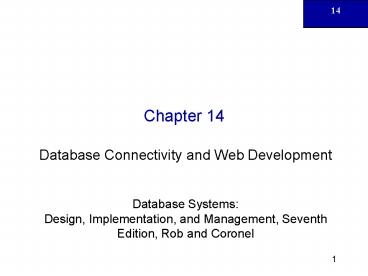Database Connectivity and Web Development - PowerPoint PPT Presentation
1 / 25
Title:
Database Connectivity and Web Development
Description:
... About the different database connectivity technologies How Web-to-database middleware is used to integrate ... program Native SQL Connectivity Refers to ... – PowerPoint PPT presentation
Number of Views:103
Avg rating:3.0/5.0
Title: Database Connectivity and Web Development
1
Chapter 14
- Database Connectivity and Web Development
- Database Systems Design, Implementation, and
Management, Seventh Edition, Rob and Coronel
2
In this chapter, you will learn
- About the different database connectivity
technologies - How Web-to-database middleware is used to
integrate databases with the Internet - The first steps in building a Web-based database
front end using Macromedia ColdFusion - What Extensible Markup Language (XML) is and why
it is important for Web database development
3
Database Connectivity
- Refers to mechanisms through which application
programs connect and communicate with data
repositories - Database connectivity software is also known as
database middleware - Data repository, also known as data source,
represents the data management application that
will be used to store data generated by
application program
4
Native SQL Connectivity
- Refers to connection interface that is provided
by database vendor and is unique to that vendor - Best example of that type of native interface is
Oracle RDBMS - To connect client application to Oracle database,
you must install and configure Oracles SQLNet
interface in client computer
5
Native SQL Connectivity (continued)
6
ODBC, DAO, and RDO
- Open Database Connectivity (ODBC)
- Microsofts implementation of a superset of SQL
Access Group Call Level Interface (CLI) standard
for database access - Probably most widely supported database
connectivity interface - Allows any Windows application to access
relational data sources, using SQL via standard
application programming interface (API)
7
ODBC, DAO, and RDO (continued)
- Data Access Objects (DAO)
- Object-oriented API used to access MS Access, MS
FoxPro, and dBase databases from Visual Basic
programs - Provided an optimized interface that exposed
functionality of Jet data engine to programmers - DAO interface can also be used to access other
relational style data sources
8
ODBC, DAO, and RDO (continued)
- Remote Data Objects (RDO)
- Higher-level object-oriented application
interface used to access remote database servers - Uses lower-level DAO and ODBC for direct access
to databases - Was optimized to deal with server-based
databases, such as MS SQL Server, Oracle, and DB2
9
ODBC, DAO, and RDO (continued)
10
ODBC, DAO, and RDO (continued)
- Basic ODBC architecture has three main
components - High-level ODBC API through which application
programs access ODBC functionality - Driver manager that is in charge of managing all
database connections - ODBC driver that communicates directly to DBMS
11
ODBC, DAO, and RDO (continued)
12
ODBC, DAO, and RDO (continued)
13
OLE-DB
- Object Linking and Embedding for Database
- Database middleware that adds object-oriented
functionality for access to relational and
nonrelational data - Composed of series of COM objects that provide
low-level database connectivity for applications - OLE-DB model is better understood when you divide
its functionality into following types of
objects - Consumers
- Providers
14
OLE-DB (continued)
15
OLE-DB (continued)
- OLE-DB did not provide support for scripting
languages - ActiveX Data Objects (ADO) provides high-level
application-oriented interface to interact with
OLE-DB, DAO, and RDO - ADO provides unified interface to access data
from any programming language that uses the
underlying OLE-DB objects
16
OLE-DB (continued)
17
OLE-DB (continued)
18
ADO.NET
- ADO.NET is data access component of Microsofts
.NET application development framework - Introduced two new features critical for
development of distributed applications DataSets
and XML support - DataSet is disconnected memory-resident
representation of database - DataSet is internally stored in XML format and
data in DataSet can be made persistent as XML
documents
19
ADO.NET (continued)
20
ADO.NET (continued)
- ADO.NET comes with two standard data providers
- Data provider for OLE-DB data sources
- Data Provider for SQL Server
- No matter data provider, it must support set of
specific objects in order to manipulate data in
data source - Connection
- Command
- DataReader
- DataAdapter
- DataSet
- DataTable
21
Internet Databases
- Web database connectivity allows new innovative
services that - Permit rapid response to competitive pressures by
bringing new services and products to market
quickly - Increase customer satisfaction through creation
of Web-based support services - Yield fast and effective information
dissemination through universal access from
across street or across globe
22
Internet Databases (continued)
23
Web-to-Database Middleware Server-Side
Extensions
- Also known as Web-to-database middleware
- Program that interacts directly with Web server
to handle specific types of requests - Provides its services to Web server in way that
is totally transparent to client browser
24
Web-to-Database Middleware Server-side
Extensions (continued)
25
Web Server Interfaces
- Two well-defined Web server interfaces
- Common Gateway Interface (CGI)
- Application programming interface (API)

